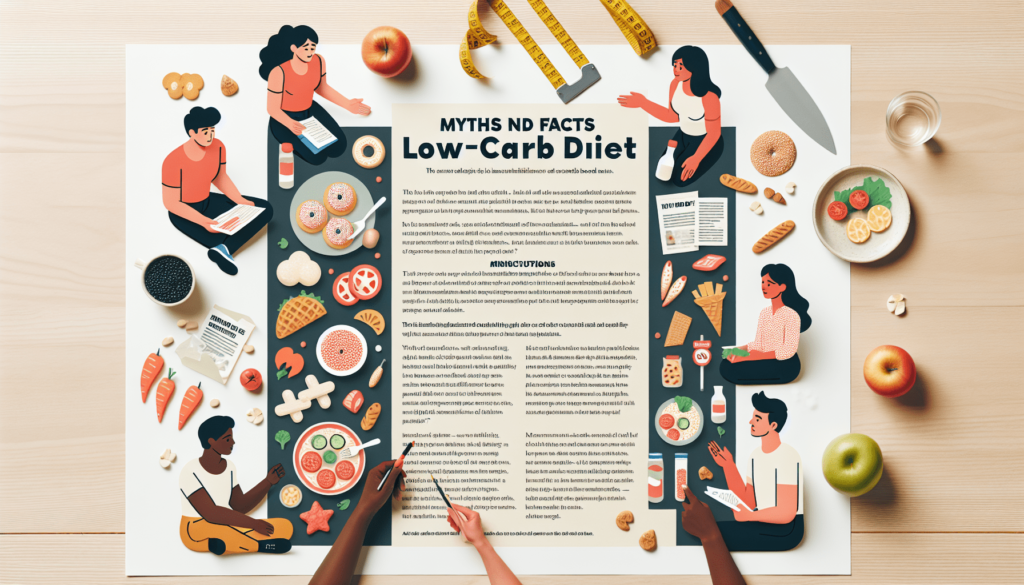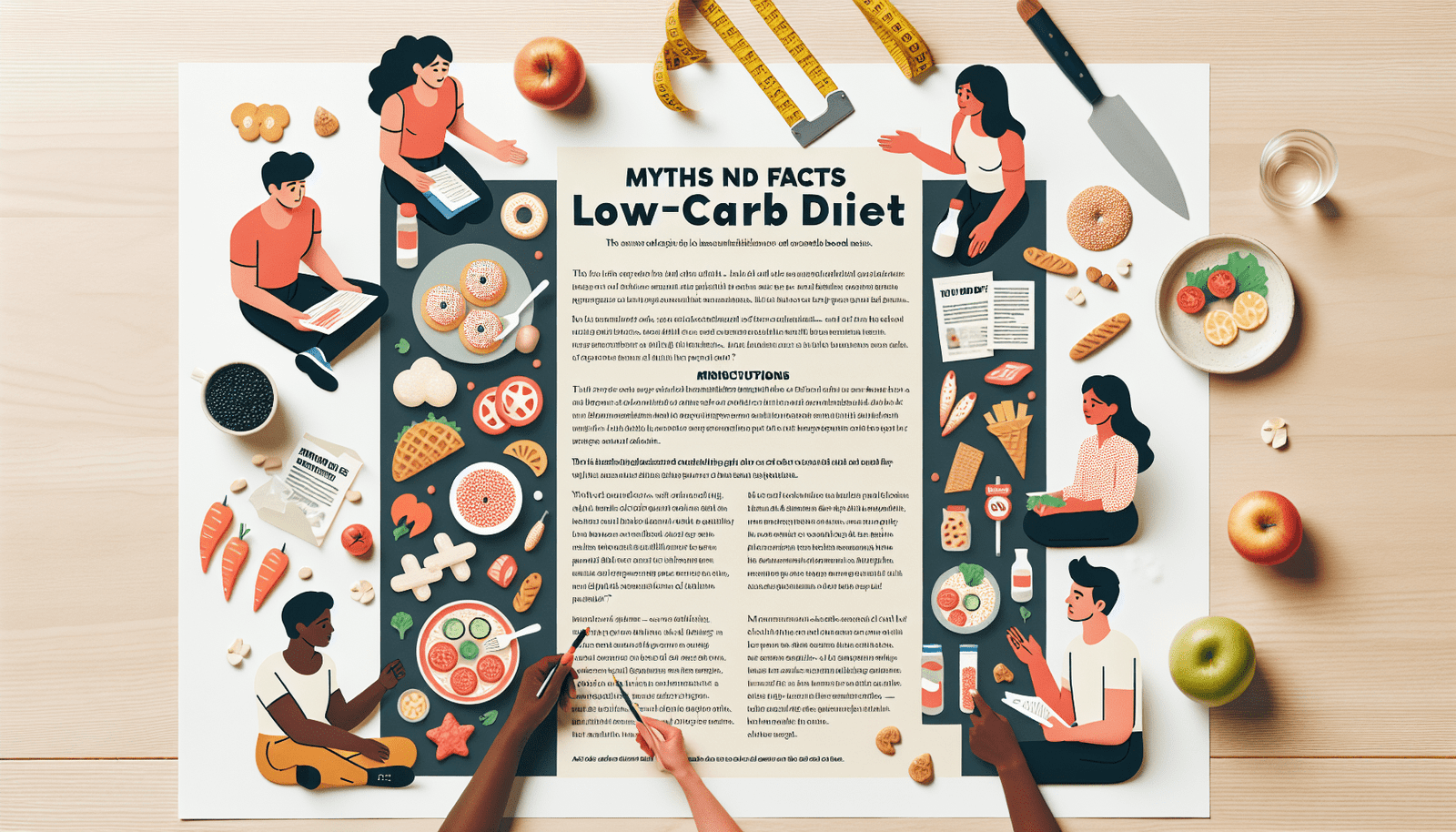Are you curious about the truth behind low-carb diets? In this article, we will shed light on the subject, debunking common misconceptions and providing you with reliable information. Whether you are considering adopting a low-carb lifestyle or simply looking to expand your knowledge, we have got you covered. Get ready to separate fact from fiction and gain a clearer understanding of the benefits and potential drawbacks of low-carb diets.

What are low-carb diets?
Low-carb diets are dietary plans that restrict the intake of carbohydrates, typically to less than 20-100 grams per day. These diets emphasize consuming foods rich in protein, healthy fats, and non-starchy vegetables while reducing or eliminating foods high in carbohydrates such as grains, sugars, and certain fruits. The main goal of low-carb diets is to switch the body’s primary source of fuel from carbohydrates to fat, leading to weight loss and various health benefits.
Definition of low-carb diets
Low-carb diets are characterized by their focus on reducing carbohydrate intake and increasing the consumption of protein and fat. While the specific daily carbohydrate limit may vary depending on the individual and the type of low-carb diet followed, they generally involve limiting or eliminating processed foods, refined grains, sugars, and starchy vegetables. This forces the body to enter a metabolic state called ketosis, where it burns stored fat for energy.
Types of low-carb diets
There are several types of low-carb diets, each with its own specific guidelines. Some common types include the ketogenic diet, which restricts carbohydrate intake to a very low level (usually below 20 grams per day) and emphasizes high fat consumption; the Atkins diet, which involves multiple phases and incrementally increases carbohydrate intake; and the paleo diet, which focuses on whole, unprocessed foods and eliminates grains and dairy products. Other variations include the South Beach diet and the Mediterranean diet, which have lower but not extremely low carbohydrate limits.
Benefits of low-carb diets
Low-carb diets have been associated with numerous health benefits.
Weight loss
One of the primary benefits of low-carb diets is weight loss. When carbohydrates are restricted, the body is forced to burn stored fat for energy, leading to a decrease in body weight. In addition, low-carb diets often result in a decrease in appetite and calorie intake, as protein and healthy fats tend to be more satiating than carbohydrates. Studies have shown that low-carb diets can be more effective in promoting weight loss than low-fat diets, especially in the short term.
Improved blood sugar control
Low-carb diets have been found to have positive effects on blood sugar control, making them beneficial for individuals with type 2 diabetes or insulin resistance. By reducing carbohydrate intake, the body experiences reduced spikes in blood sugar levels, leading to enhanced insulin sensitivity. This can result in better glycemic control and decreased reliance on medication for diabetes management.
Reduced risk of chronic diseases
Following a low-carb diet has been associated with a reduced risk of chronic diseases such as cardiovascular disease, metabolic syndrome, and certain types of cancer. By minimizing carbohydrate intake, low-carb diets have been shown to improve markers of cardiovascular health, including blood pressure, triglyceride levels, and HDL cholesterol. Additionally, they may help lower inflammation, which is a common underlying factor in many chronic diseases.
Potential risks of low-carb diets
While low-carb diets have significant benefits, it’s important to consider potential risks.
Nutrient deficiencies
Restricting carbohydrate-rich foods may lead to inadequate intake of essential vitamins, minerals, and fiber. This is particularly true if individuals do not replace these foods with nutrient-dense options. In order to mitigate this risk, it’s essential to focus on consuming a variety of foods, including non-starchy vegetables, nuts, seeds, and lean protein sources.
Increased risk of heart disease
The high intake of saturated fats often associated with low-carb diets has raised concerns about increased risk of heart disease. While some studies have suggested a higher risk, others have found no significant difference. It’s important to note that the quality of fats consumed is crucial. Opting for sources of healthy fats such as avocados, olive oil, and nuts can help mitigate this risk.
Difficulty in sustainability
For some individuals, adhering to a low-carb diet can be challenging in the long term. The strict limitations on carbohydrate intake may make it difficult to maintain social engagements or follow the diet while traveling. It’s important to find a sustainable way of eating that suits individual preferences and lifestyle, as long-term adherence is key to reaping the benefits.
Myths about low-carb diets
There are several myths surrounding low-carb diets that need to be clarified.
Low-carb diets are all the same
Contrary to popular belief, low-carb diets are not all the same. While the basic principle of carbohydrate restriction remains consistent, the specific guidelines and recommendations can vary among different low-carb approaches. It’s important to understand the nuances of different low-carb diets and choose one that aligns with personal preferences and health goals.
They lead to faster weight loss
While low-carb diets have been associated with initial rapid weight loss, the rate of weight loss tends to level off over time. Sustainable weight loss is influenced by various factors, including overall calorie intake, exercise, and individual metabolic rates. While low-carb diets can be effective for weight loss, it’s important to approach it as a long-term lifestyle change rather than a quick fix.
They are unhealthy
Low-carb diets are often criticized as being unhealthy due to the restriction of certain food groups, particularly carbohydrates. However, when implemented correctly, low-carb diets can provide all the essential nutrients needed for optimal health. It’s crucial to prioritize nutrient-dense foods, such as vegetables, lean proteins, and healthy fats, to ensure a well-rounded and balanced diet.

Fact-checking low-carb diet claims
Let’s debunk some common claims about low-carb diets.
Are all carbs bad?
Contrary to popular belief, not all carbohydrates are bad. Low-carb diets typically aim to reduce the intake of refined carbohydrates, such as white bread and sugary beverages, which offer little nutritional value. However, complex carbohydrates found in whole grains, legumes, and certain fruits can provide essential nutrients, fiber, and sustained energy. It’s important to distinguish between healthful and unhealthful sources of carbohydrates.
Can low-carb diets cause ketosis?
Yes, low-carb diets can induce a metabolic state called ketosis, where the body primarily burns fat for fuel instead of carbohydrates. This occurs when carbohydrate intake is significantly reduced, and the body starts producing ketones, which are molecules used as an alternative fuel source. Ketosis is not inherently harmful but should be monitored and managed under the guidance of a healthcare professional.
Are low-carb diets suitable for everyone?
While low-carb diets can be effective for weight loss and improving certain health markers, they may not be suitable for everyone. Individuals with certain medical conditions, such as kidney disease or rare metabolic disorders, may need to avoid or modify low-carb diets. It’s important to consult with a healthcare professional or registered dietitian before making significant changes to your diet.
Scientific evidence on low-carb diets
Numerous studies have investigated the effects of low-carb diets on weight loss and health outcomes.
Studies on low-carb diets
Several studies have demonstrated that low-carb diets can lead to greater weight loss compared to low-fat diets in the short term. These studies have also shown improvements in markers of cardiovascular health, such as decreased blood pressure and improved lipid profiles. However, it’s worth noting that long-term studies are limited, making it difficult to draw definitive conclusions about the sustained efficacy and safety of low-carb diets.
Effectiveness for weight loss
Research consistently shows that low-carb diets can lead to significant weight loss, particularly in the first few months of adherence. This weight loss is often attributed to the reduction in calorie intake resulting from decreased appetite and increased satiety. However, long-term weight maintenance requires sustainable dietary changes, regular physical activity, and behavior modifications.
Impact on cardiovascular health
The impact of low-carb diets on cardiovascular health is a topic of ongoing research. Some studies have shown improvements in various markers of cardiovascular disease risk, such as decreased triglycerides and increased HDL cholesterol levels. However, other research suggests that the quality of fats consumed on a low-carb diet may influence cardiovascular outcomes. More long-term studies are needed to fully understand the effects on cardiovascular health.
Tips for a successful low-carb diet
To make the most of a low-carb diet, consider following these tips:
Include a variety of foods
While low-carb diets restrict certain food groups, it’s important to incorporate a wide range of nutrient-dense foods to meet your nutritional needs. Focus on consuming non-starchy vegetables, lean proteins, healthy fats, and moderate amounts of low-carb fruits and whole grains. This will ensure you receive a balance of essential vitamins, minerals, and fiber.
Focus on healthy fats
When following a low-carb diet, it’s crucial to choose healthy sources of fats to fuel your body. Opt for foods like avocados, nuts, seeds, olive oil, and fatty fish. These fats provide important nutrients and can help promote feelings of fullness and satiety.
Monitor portion sizes
While low-carb diets may not require strict calorie counting, it’s still important to monitor portion sizes for optimal weight management. Pay attention to your body’s hunger cues and prioritize eating until you feel satisfied, rather than overly full. Be mindful of portion sizes for higher calorie foods, such as nuts and oils, as they can contribute to overall calorie intake.
Low-carb substitutes and recipes
When adopting a low-carb diet, it’s helpful to have alternatives to your favorite high-carb foods. Here are some options:
Alternative foods to replace high-carb options
Instead of traditional pasta, try using zucchini noodles or spaghetti squash. Cauliflower rice can replace regular rice, and lettuce wraps can replace tortillas or bread for sandwiches. Almond flour or coconut flour can be used as substitutes for wheat flour in baking.
Low-carb meal ideas and recipes
For breakfast, try a spinach and mushroom omelet with a side of avocado. Lunch could consist of a grilled chicken Caesar salad with a homemade dressing. For dinner, consider salmon with roasted asparagus and cauliflower mash. For snacks, opt for nuts, cheese, Greek yogurt, or vegetable sticks with hummus.
Consulting a healthcare professional
Before embarking on a low-carb diet, it’s crucial to consult with a healthcare professional.
Importance of seeking medical advice
A healthcare professional can help determine if a low-carb diet is suitable for your specific health needs and goals. They can evaluate your medical history, current medications, and any pre-existing conditions to ensure a low-carb approach is safe and appropriate.
Customizing a low-carb diet plan
A healthcare professional or registered dietitian can customize a low-carb diet plan that meets your individual needs. They can provide guidance on macronutrient distribution, portion sizes, and nutrient-rich food choices. They can also assist in monitoring your progress and making adjustments as necessary.
Conclusion
Low-carb diets can be an effective way to achieve weight loss and improve various health markers. By reducing carbohydrate intake and focusing on nutrient-dense foods, individuals may experience improved blood sugar control, reduced risk of chronic diseases, and sustainable weight loss. It’s important to consult with a healthcare professional and customize a low-carb diet plan that suits individual needs and preferences. Remember to prioritize nutrient variety, healthy fats, and portion control for long-term success on a low-carb diet.

